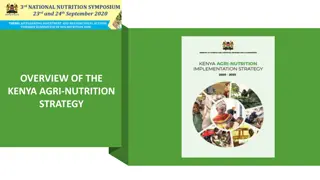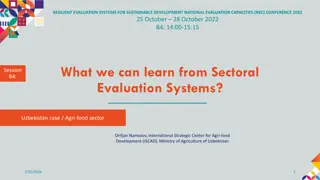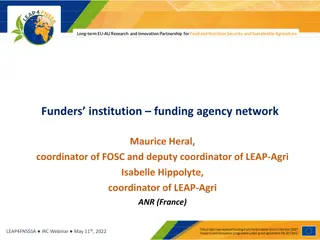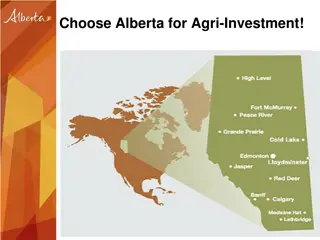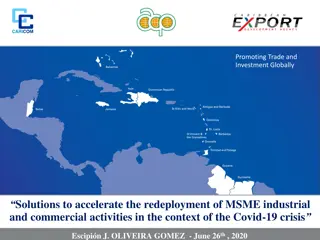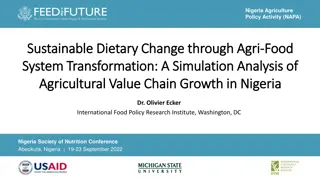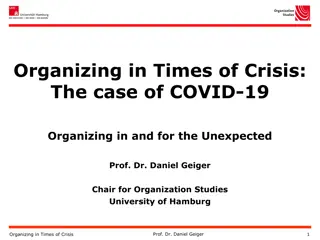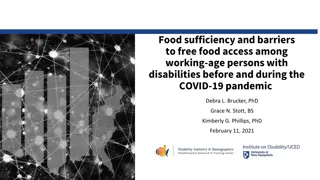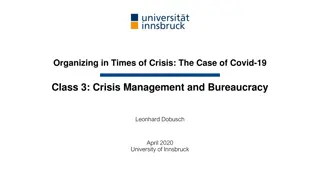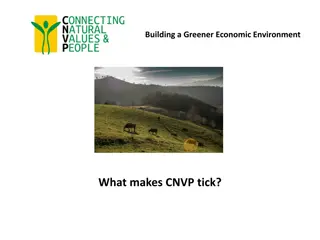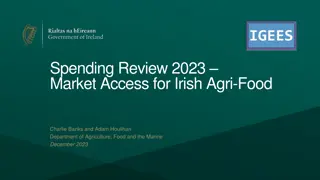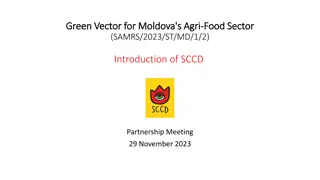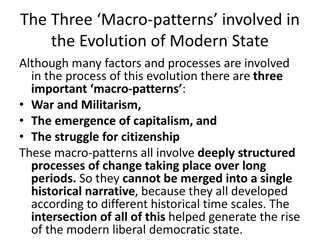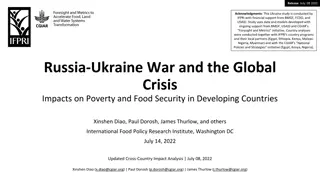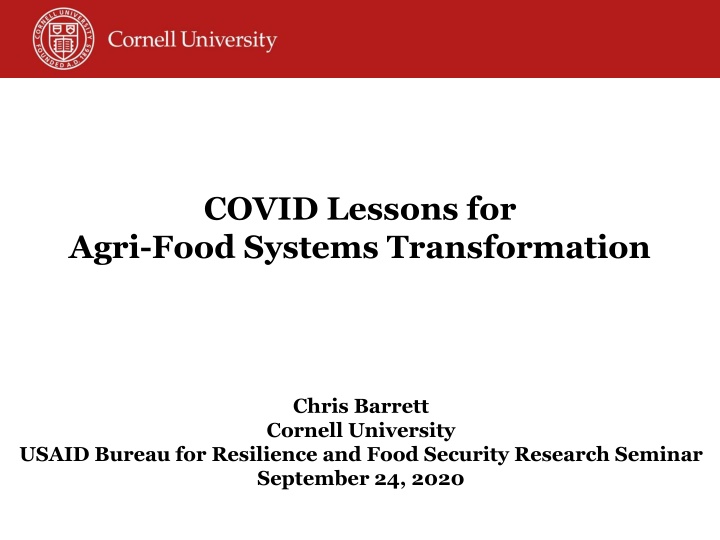
Lessons for Agri-Food Systems Transformation Amid COVID Crisis
The COVID crisis has brought unique challenges to agri-food systems, leading to disruptions in supply chains and livelihoods. Key lessons include the need for resilience, safety nets, and attention to slower-moving shocks like climate change.
Uploaded on | 2 Views
Download Presentation

Please find below an Image/Link to download the presentation.
The content on the website is provided AS IS for your information and personal use only. It may not be sold, licensed, or shared on other websites without obtaining consent from the author. If you encounter any issues during the download, it is possible that the publisher has removed the file from their server.
You are allowed to download the files provided on this website for personal or commercial use, subject to the condition that they are used lawfully. All files are the property of their respective owners.
The content on the website is provided AS IS for your information and personal use only. It may not be sold, licensed, or shared on other websites without obtaining consent from the author.
E N D
Presentation Transcript
COVID Lessons for Agri-Food Systems Transformation Chris Barrett Cornell University USAID Bureau for Resilience and Food Security Research Seminar September 24, 2020
COVID and food systems The COVID shock differs fundamentally from 2008-11 or most others World accustomed to supply shocks to primary production or to logistics. This, instead, is a massive: (i) demand shock disrupting livelihoods, thus demand (ii) food value chain shock through disruptions to (a) transport and (b) food service industries, both of which have disrupted prices/flows within distinct chains. (but supply shock could arise from movement restrictions). COVID both a caution and an accelerator for food systems transformation must build back better
12 key lessons So what are the key pandemic lessons for agri-food systems transformation? A preliminary assessment of the Cornell Atkinson Nature Sustainability expert panel on Innovations to Build Sustainable, Equitable, Inclusive Food Value Chains . Four HERS objectives: Healthy Diets, Equitable livelihoods, Resilient to shocks, climate/env tSustainability [Caveat: we omit obvious: public health 1st order priority]
Key lesson #1 Stuff happens! Be ready Not a one-off, short-run shock Won t be the last major challenge of our lifetimes Prepare for more severe and more frequent shocks Need greater resilience incl. redundancy in AFS
Key lesson #2 Need every-ready safety nets Starvation is the characteristic of some people not having enough food to eat. It is not the characteristic of there beingnot enough food to eat. (emphasis in original) - Opening sentences, Amartya Sen, 1981 Poverty & Famines Food systems performance is ultimately about people - today (healthy diets, equitable/inclusive livelihoods) - tomorrow (climate/env t sustainability, resilience) People need assurance of protection. Otherwise, high human costs, plus social solidarity/cooperation lag. Can t build reliable, scalable programs on the fly.
Key lesson #2 Need every-ready safety nets Social protection upscaling has been strong, but coverage w/n LICs remains anemic. Overwhelmingly cash transfers. Source: Gentilini et al. WB
Key lesson #3 Beware slower-moving shocks Fast-moving pandemic compels policymaker attention Beware slower moving, but equally consequential shocks: climate change, biodiversity/habitat loss, sea level rise Slower transition too often engenders complacency We must act now on slower-moving changes that will be equally catastrophic if we don t prepare.
Key lesson #4 Beyond cost minimization Affordable, healthy diets are important for equity. But tradeoffs w/resilience and sustainability objectives. De-risking AFS requires greater diversification of production, sourcing, processing, and distribution patterns to enhance flexibility and redundancy. De-risking provides costly insurance against catastrophic systemic risks
Key lesson #5 Beware de-globalization Many gov ts indulge populist instincts towards self- sufficiency in response to supply chain disruptions. That risks environmental/climate sustainability b/c how a product is produced, processed and distributed matters far more to its env t footprint than where it was made. Must redouble efforts to internalize the longer-run and global externalities associated with the pursuit of short-run political gains from increased local control over AVCs
Key lesson #6 Fund and trust first rate science Technical skill is essential preparation Can adaptively manage and innovate only if we learn fast Can t build scientific capacity fast But can undermine scientific capacity and trust in science - quickly through poor communications, especially if leaders let politics trump science
Key lesson #7 Barriers to success more behavioral than scientific The science has progressed at unprecedented speed Behavioral adjustments have been slower, more uneven Must work through social influencers and thought leaders to shift culture and policy Need checks and balances to avoid excessive concentration of political/commercial power
Key lesson #8 Incentives and norms are key AFS are decentralized systems are huge #s of actors. No grand systems optimization is feasible. Coordinated, centralized responses are difficult at national, much less global, scale Incentives/norms, not top-down directives, are key policy instruments. Must be clear, consistent, trusted. Market-based, decentralized systems self-stabilized reasonably quickly and well under the circumstances. Farm-to-fork digital markets have facilitated adjustment.
Key lesson #9 Communication and cooperation essential Spillovers are ever-present Strong coordinating institutions essential to build and maintain trust so as to quickly identify/contain contagion Trust inevitably requires verification, so traceability is increasingly at a premium. Firms increasingly looking to traceability technologies to capture WTP for credence attributes of foods: sustainability, fairness, etc.
Key lesson #10 Dramatic, fast improvements are possible Behavioral change is hard but feasible. Rapid, sharp adjustments have happened worldwide w/ measurable results: quickly reduced GHG/ pollution emissions, sharply slowed disease transmission. Need incentives to exert ourselves Must develop viable C markets, PES, conservation finance
Key lesson #11 Treat underlying causes, not just symptoms Pandemics are the long-predicted consequence of: - ongoing destruction of nature more zoonoses - inconsistent, non-transparent food safety regulations - insufficient integration of food and health systems Must de-agrarianize actively decouple food from land. Big opportunities from CEA, precision fermentation, circular feeds, etc. Enhance traceability through biomarkers, micro-sensors, distributed ledgers, etc.
Key lesson #12 Need high-frequency monitoring Shocks to systems require near-real-time monitoring of fast-changing conditions. Need sentinel sites for traditional survey work Innovations in remote sensing, digital admin records, crowd-sourcing create opportunities to enable timely and cost-effective responses to systemic shocks.
Innovations implications The pandemic experience should boost innovations in several directions De-agrarianization: need to decouple food production from land to reduce anthropogenic land conversion, mitigate/adapt CC, even shorten local food supply chains. Traceability: capture foods credence env t/health attributes to internalize externalities. Circular economy: novel feeds and fertilizers based on waste re-use show considerable potential Social protection innovations: safety nets essential
Thank you Thank you for your interest We invite your comments



